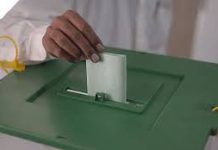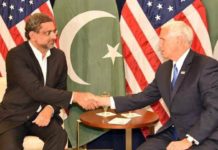Web Desk
President Dr Arif Alvi has dissolved the National Assembly, the lower house of Pakistan’s Parliament, on Prime Minister Imran Khan’s advice under Article 58 of the Constitution.
“The president of Pakistan, Dr Arif Alvi, has approved the advice of the prime minister of Pakistan to dissolve the National Assembly under the Article 58 (1) read with Article 48(1) of the Constitution of the Islamic Republic of Pakistan,” according to a statement issued by the President’s Secretariat.
Earlier on Sunday, Prime Minister Imran, in an address to the nation, said he had advised the president to “dissolve assemblies”.
According to Article 58, “The president shall dissolve the National Assembly if so advised by the prime minister; and the National Assembly shall, unless sooner dissolved, stand dissolved at the expiration of forty-eight hours after the prime minister has so advised.”
The premier’s announcement came moments after National Assembly Deputy Speaker Qasim Suri, who was chairing today’s session, dismissed the no-confidence motion against Prime Minister Imran Khan, terming it a contradiction of Article 5 of the Constitution, which says loyalty to the state is the basic duty of every citizen.
The government claims that the no-trust motion against the premier was a “foreign funded conspiracy”, citing a ‘threat letter’ that was received from a foreign country through Pakistan’s ambassador, asking for the removal of PM Imran.
The military, meanwhile, distanced itself with the political developments in the country. “Army has nothing to do with the political process,” Major General Babar Iftikhar, the head of the military’s public relations wing, told news channels in response to a question about the institution’s involvement in Sunday’s developments.
In his address today, Prime Minister Imran congratulated the nation for the no-trust motion being dismissed, saying the deputy speaker had “rejected the attempt of changing the regime [and] the foreign conspiracy”.
The premier said he had been receiving messages from many people who were worried, adding that “treason” was being committed in front of the nation. “I want to say, ‘ghabrana nahi hai’ (do not worry). God is watching over Pakistan.”
He said he had written to the president with advice to dissolve the assemblies, adding that the democrats should go to the public and elections should be held so the people could decide who they wanted in power.
Prime Minister Imran said the “billions of rupees” that had been spent to “buy” lawmakers’ votes would be wasted and advised those who had taken money to donate it to orphanages and the poor.
“Prepare for elections. No corrupt forces will decide what the future of the country will be. When the assemblies will be dissolved, the procedure for the next elections and the caretaker government will begin,” he added.
Shortly afterwards, Information Minister Fawad Chaudhry said the prime minister’s advice to dissolve the National Assembly had been sent to President Dr Arif Alvi under Article 58 of the Constitution.
In a separate tweet, he said the cabinet had been dissolved while PM Imran would continue in office under Article 224 of the Constitution, which is related to elections and by-elections.
According to the article, after the dissolution of the NA, the president, in consultation with the prime minister and the leader of the opposition, would appoint a caretaker prime minister.
It further states: “When the National Assembly or a provincial assembly is dissolved, a general election to the assembly shall be held within a period of ninety days after the dissolution, and the results of the election shall be declared not later than fourteen days after the conclusion of the polls.”
Later in the day, PM Imran, while talking to his party officials, said he wanted to explain what had happened in the NA since “the opposition still can’t understand [what has happened].”
He said a meeting of the National Security Council (NSC) had “clearly said” that the no-confidence motion was subject to a foreign interference.
The premier said that in the NSC meeting attended by all the security chiefs, the minutes of the meeting and conversation between Pakistan’s former US ambassador Asad Majeed and Assistant Secretary of State for South and Central Asian Affairs Donald Lu were released in which it was “confirmed that it (no-trust motion) was a plan made from abroad in which Pakistan’s internal politics were meddled with”.
The prime minister alleged that US embassy officials had also met PTI dissidents, questioning the need for them to do so. He claimed that the meetings were a part of the no-confidence vote against him.
“When the country’s highest security body confirms it (the conspiracy) then these the NA proceedings and the number of [MNAs] there was irrelevant.”
Imran Khan, elected in July 2018 vowing to tackle corruption and fix the economy, remains popular with some voters, even though a lot of his public support has been lost as a result of rocketing inflation and ballooning foreign debt.
There have been only two previous instances in Pakistan’s political history when sitting prime ministers faced a vote of no confidence, and both times Benazir Bhutto, in 1989, and Shaukat Aziz, in 2006, emerged unscathed.















